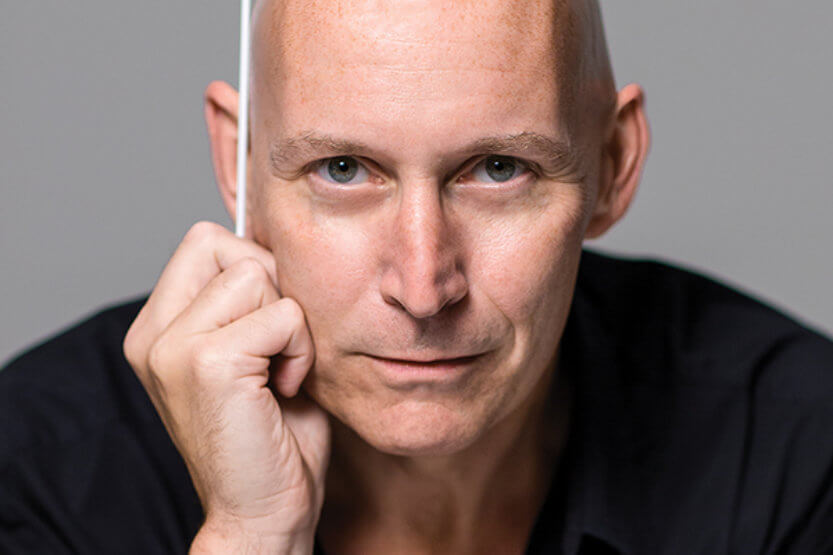Alumni Interview: Kevin Rhodes
 Kevin Rhodes, MMUS ’90, is the music director and conductor of Massachusetts’ Springfield Symphony Orchestra and Michigan’s Traverse Symphony Orchestra. (Image by John Robert Williams)
Kevin Rhodes, MMUS ’90, is the music director and conductor of Massachusetts’ Springfield Symphony Orchestra and Michigan’s Traverse Symphony Orchestra. (Image by John Robert Williams) When people hear that I’m a conductor, most assume I grew up in a music-rich home. Not me. My parents ran a 24-hour truck-stop diner in Evansville, Ind. The only music came from the juke box. My interest was inspired by a public school kindergarten teacher who played piano and led us kids in song. I loved it, and begged my parents for a piano.
One day, my father lugged in a used piano he bought from the guy who owned the pinball machines in the diner. By fourth grade, I was playing for the school choir. Before long, I was conducting the bands and orchestras in community theater musicals and playing in Ramada Inn cocktail lounges, and never looked back.
I had a great experience at Illinois. While an undergraduate at Michigan State, I attended the prestigious conducting class given by Paul Vermel [U of I professor emeritus of music] at the Aspen Music Festival. He had so many fascinating things to say, and I so admired his way of looking at music.
I asked him if he had a graduate program at U of I. “No,” he said, “but I’m starting one.” For two years, I was his only student. I had a fabulous time, and became the first person to earn a master’s degree in orchestral conducting from Illinois.
What do conductors do? It’s like coaching a team. You provide a framework and set a tone. You maximize the strengths and minimize the weaknesses.
Perhaps the conductor’s most important task is building chemistry among the players. It’s different with every group. It’s actually easier with a larger orchestra, perhaps because the players have a stronger sense of being part of the whole.
Today’s audiences want a conductor who has some flair. Two charismatic and skilled conductors whose careers coincided with the development of filmed concerts, Leonard Bernstein and Herbert von Karajan, brought that about. Today’s questions include: Can you dominate the room, musically speaking? Can you physically pull the group together? How will you look on the poster?
I’ve been incredibly fortunate. I’ve conducted all over the world, and done all sorts of things. Versatility has become my specialty!
There are interesting differences between conducting a symphony, an opera and a ballet. Most important is the degree to which you need to be a team player.
As the conductor of a symphony, you are in charge. You collaborate with guest artists, but you have the last word. In an opera, there are many artists, many singers who come with strong ideas and approaches. You have to identify the stars, and recognize the constellation you are in. There is more give and take. But for all the extra effort, it’s fun and exciting.
Ballet requires the most flexibility. A conductor has to adapt the orchestra’s performance to the strengths of the dancers. Say you have a dancer who can leap and really stay in the air—you play the music at tempo X. But say you have a dancer who can’t leap as well. Then you play tempo Y. In a ballet, the conductor must adjust the music to allow everyone on stage to do their work, while making the music sound like it should be played that way.
A number of unique projects came my way late in the summer of 2015. The Springfield Symphony Orchestra got a call from the New England Patriots. They wanted to know if we could perform at their season opener, as part of the celebration of their Super Bowl victory from the previous February. Well sure, I think we can fit that in!
They wanted us to play three minutes of music: one minute of “O Fortuna,” from Carl Orff’s Carmina Burana, which they always play when the team takes the field; and then two minutes where we would back rapper T-Pain as he performed his hit, “I Always Win.” No problem!
We had a blast. Gillette Stadium was the loudest place I had ever been. I’ll always remember chatting with T-Pain during rehearsals. He talked about his son, who played trumpet in his high school band. “I can’t get him to practice,” he said. It goes to show: Everyone has a stage persona, but underneath we all have the same concerns.


